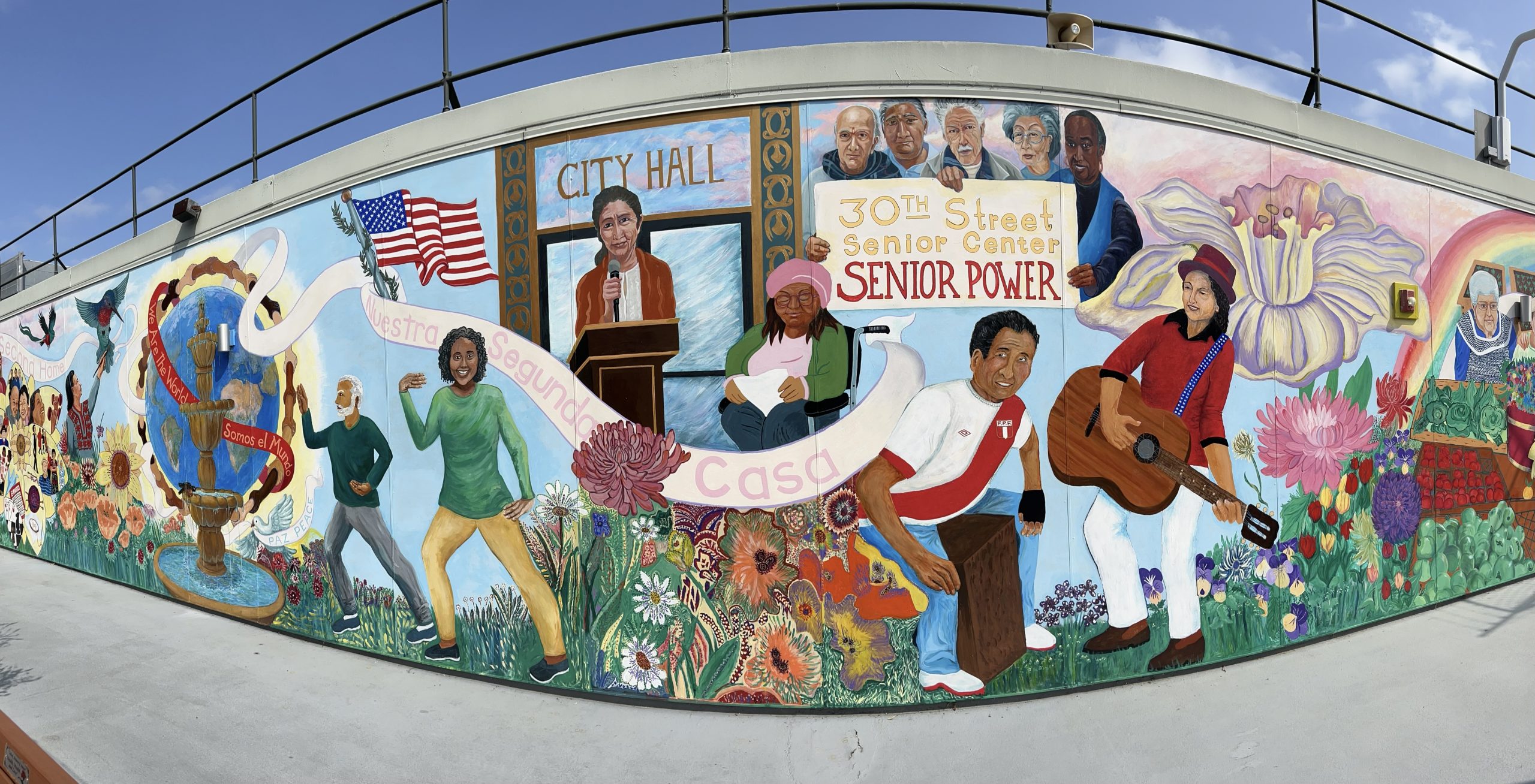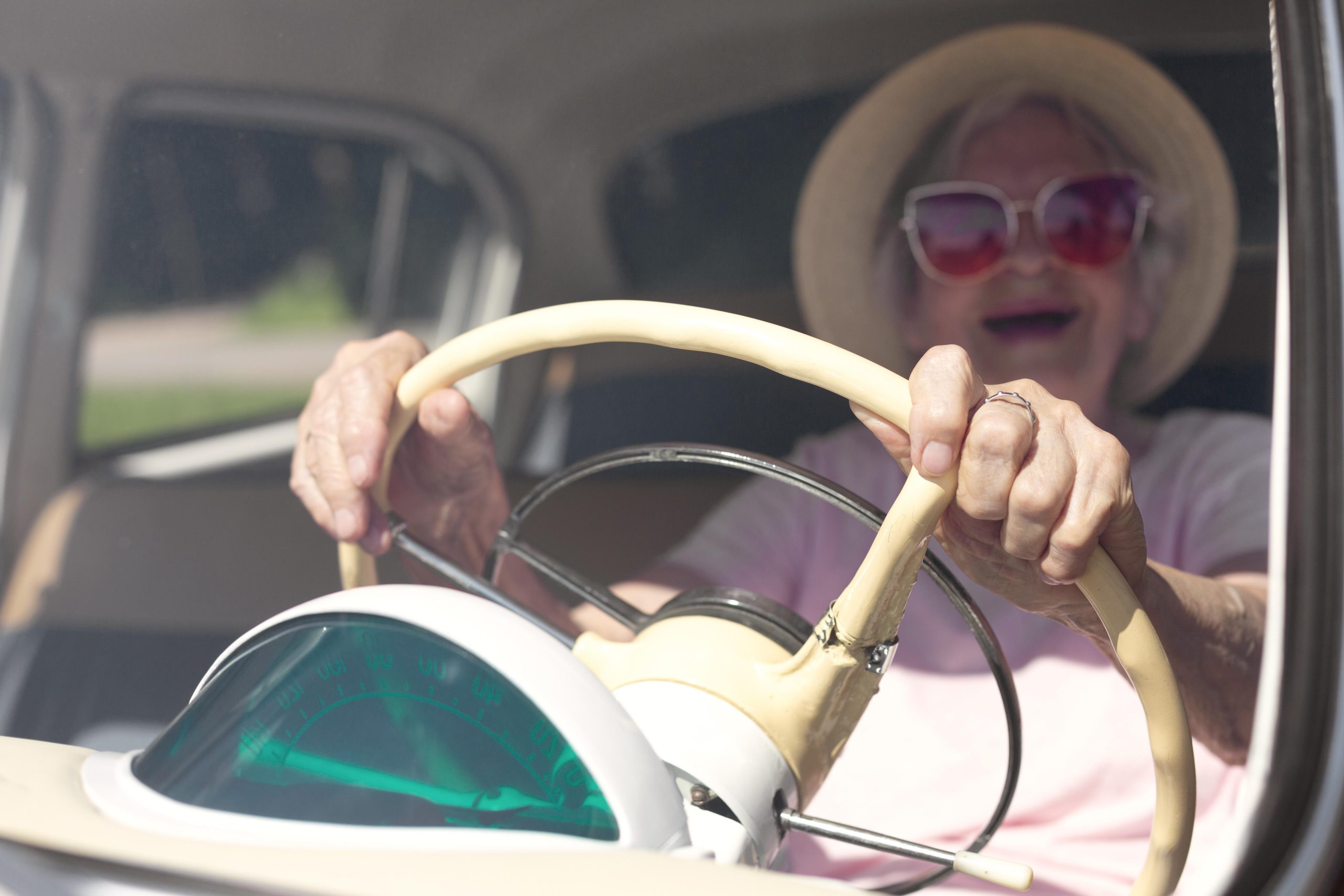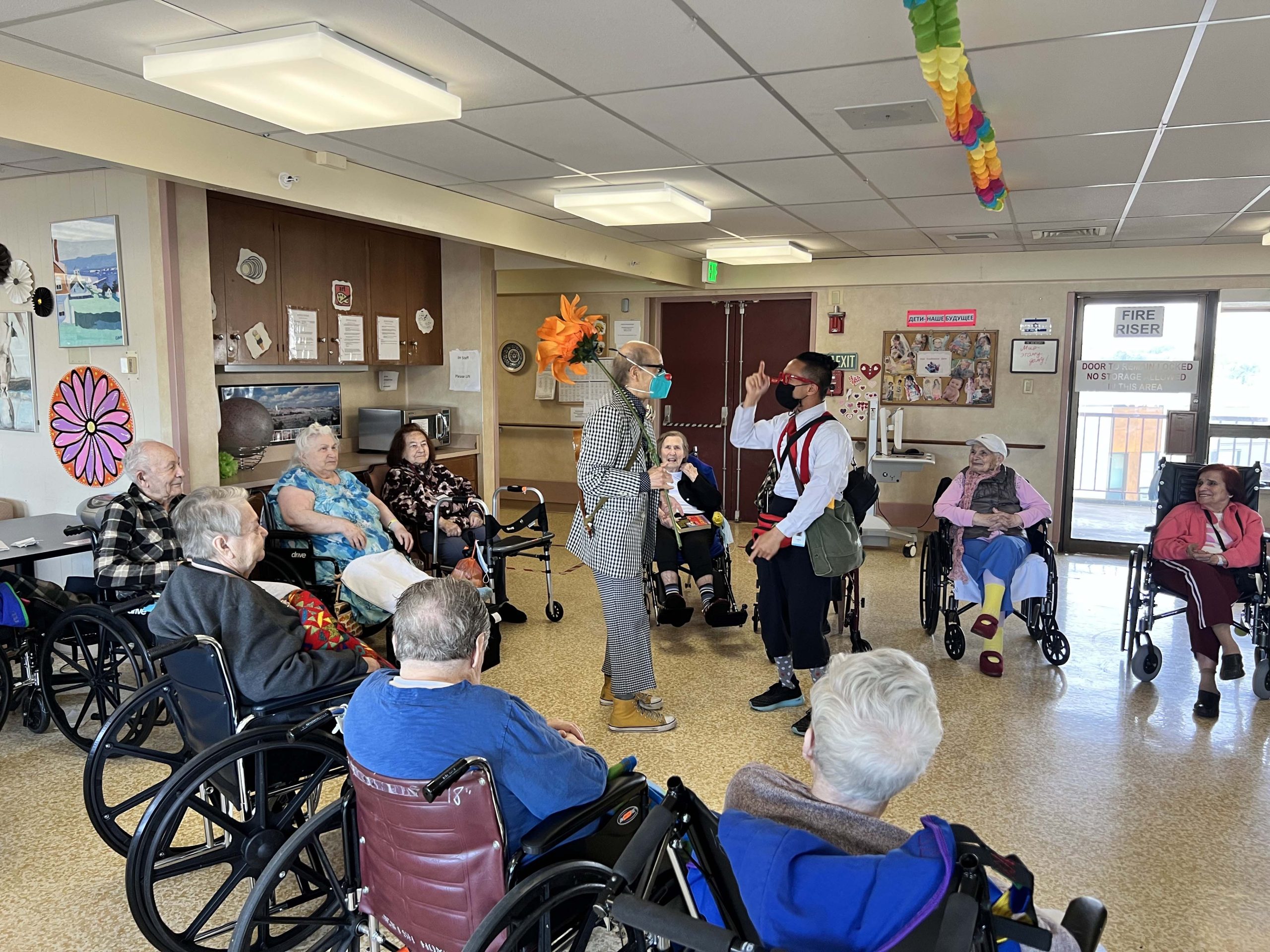Chinatown native and tour guide is a history whiz who helps local filmmakers
Despite growing up in the neglected ghetto of San Francisco’s Chinatown, where most Chinese lived until the 1940s, Dorothy Quock extols its vibrant history and culture in her work today.
For the past 28 years, Quock, now 85, has been working for Wok Wiz Chinatown Tours, leading small groups of tourists through its mysterious alleys while regaling them with stories both personal and historical.
Quock grew up in a single-room occupancy building on 35 Spofford St., in the heart of Chinatown, where four or more families lived on one floor, sharing a bath and a kitchen. She was the fifth child out of eight. “My parents were poverty-stricken and my father took whatever work he could get, she said. That included delivering sacks of rice and rolling cigars and working as a fisherman and a dishwasher.

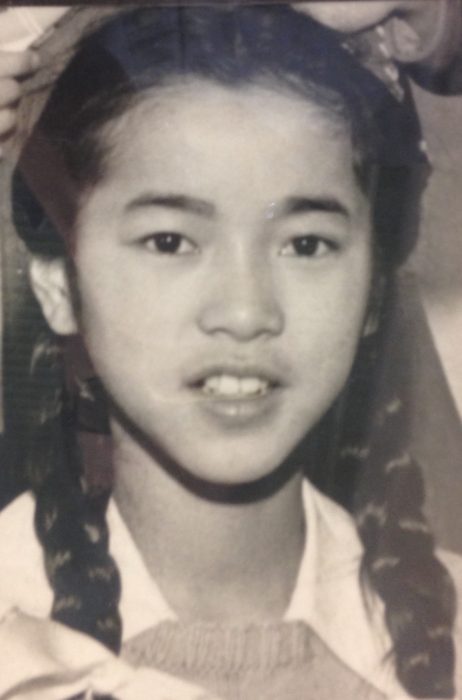
Hearing the call of “Gold Mountain,” as the Chinese then called San Francisco, Quock’s parents made their way from rural China. Her orphaned father was able to get work on a cargo vessel in his mid-20s but jumped ship when it landed in San Francisco in the early 1900s. In her teens, her mother had indentured herself as a servant to a village woman, bride-to-be of the Chinese consular of San Francisco. She likely arranged the marriage of her parents in 1923, she said.
Quock lives now within two blocks of her birthplace and is active in Chinatown, often running into friends as she conducts her tours. Because of her vast experience and knowledge of the community, local filmmaker James Q. Chan hired her as archival researcher and field producer for his Emmy-nominated documentary “Forever Chinatown.” Now, she’s assisting him on in online documentary series, expected to be ready in 2020, that focuses on the intimate, individual stories of Chinatown residents.
Saving Chinatown
It was after the 1906 earthquake and fires that Chinatown solidified its location, established in the Gold Rush era. Disaster hit as city officials were quietly planning to move the Chinese out of this potentially valuable real estate. On-the-ball Chinatown merchants who learned of City Hall’s intentions hired an architect and asked him to rebuild “oriental style” quickly.
“He was Caucasian and perhaps did not know what that really meant. He designed facades of stacked pagodas with exaggerated eaves topped with astrological creatures, buildings painted bright red, orange, green, yellow. Electricity came in, so why not put lights outlining the upturned eaves and the structures.
“Custom-designed, tall mini-pagoda lamp posts for each street corner were ordered from Hong Kong. It was so colorful, so garish, so beautiful, one could not find anything looking like this in China at that time,” ,” said Quock, pointing to Grant Avenue, Chinatown’s main street.
But the gambit paid off. When city officials came to see how the neighborhood was re-building, they decided to let Chinatown stay where it is. “They thought it would be an attraction that would bring money to the city treasury.”
A divorce in the 1970s lead to Quock’s interest in tourism. For a diversion, she returned to college, majoring in Travel and Tourism. After graduating, she got certified as a Tour Manager at the International Tour Management Institute in San Francisco.
As it happens, she soon had a chance to conduct tours in her parents’ homeland, when China opened its doors to tourism. From 1982 to 1986, she led 19 groups to the People’s Republic of China through Chinese companies that had offices in the United States.
That experience, peppered with friendships, cultural exploration of her heritage, learning Mandarin and starting to write a book on Chinese tourism, was a ripe time for Quock. “I was recovering from a divorce, and this travel and immersion in Chinese culture was healing as well as exciting.”
A fortunate introduction
Leaving her youngest daughter in her ex-husband’s care, Quock was able to stay in China between tours. “All told, during the years I led tours, I stayed in China for an accumulated 10 months,” she said. She worked on her book, gave lectures and got to know tour guides in different cities.
On her last tour to the country, Quock left her unfinished book with a Chinese travel and tourism school, hoping they would finish it. “I guess I was always having too much fun to concentrate enough on the book,” she said.
Still wanting to work in tourism, she was fortunate to gain an introduction to Shirley Fong-Torres, chef, author and Wok Wiz founder. She started giving local tours for the company in 1991. “Soon I was conducting five to seven tours a week,” Quock said, “but today I’m down to one because of my work with Chan.
In black Chinese coat and vivid red headband and gloves, Quock is easy to spot in the lobby of the Hilton Hotel across from Portsmouth Square in Chinatown, where her tour starts. “My favorite color is red.” Last year, she was featured, all in red, on the poster for “Chinatown Pretty,” a photography exhibit celebrating seniors’ street style.
Guided by style
She used to make some of her clothes – including a dress out of a rice sack left over from her father’s delivery route – but time constraints preclude that. Now she only does alternations and mending. “I rarely buy anything new, believing in conservation.”
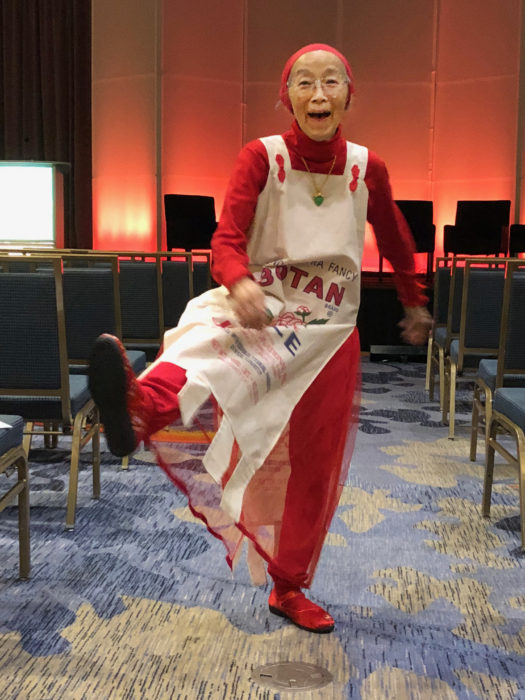

“Dorothy fascinates visitors with her life growing up here as well as historical, cultural and social facts,” said Tina Pavao, Fong-Torres’ daughter who now runs Wok Wiz tours. Quock added that tourists also appreciate the conversation that ensues with the seven-item dim sum lunch in a non-touristy restaurant.
Living in Chinatown had its pluses and minuses when Quong was growing up. She went to a segregated elementary school, whose official name was “Oriental School.” In middle school, most of her classmates were Italian and went on to Galileo High School, as she did. “From the advice of counselors, I focused on learning business skills such as typing, shorthand and bookkeeping. With those skills they said I could always find a job.”
As a teen-ager, Quock’s social life revolved around the Donaldina Cameron House. Founded in 1874 by the Presbyterian Church as the Occidental Mission Home for Girls, its initial purpose was to rescue from prostitution and indentured servitude young Asian women smuggled into the United States.
Cameron House continues to serve the changing needs of Chinatown. “It had converted into a youth center in 1947, where it became my second home since I was 13 years old,” Quock said.
Marriage, family then college
With the repeal of the Chinese Exclusion Act in 1943, fewer young women needed rescue. The Cameron House evolved, offering more faith-based programs and social activities for boys and girls. “That’s where we’d socialize and that’s where I met my future husband, Hanloy Quock.”
Having won a scholarship from Cameron House for her first year of college, she joined a liberal arts school in Salt Lake City. “After one year, I couldn’t afford to stay so I came back to San Francisco and enrolled in San Francisco State University.”
Hanloy urged Quock to marry him, wanting to avoid being drafted into the Korean War. The ceremony took place at the Presbyterian Church in Chinatown in June 1953. But he was drafted six months later and stationed in southern California.
After the birth of her first child, Quock got a job as secretary to the education librarian at San Francisco State University, where she had worked as a student assistant during college. In 1958, her husband moved the family to Livermore for a job at the Sandia Corp. She ended up working as a secretary for the First Presbyterian Church for more than 12 years while parenting three children.
A life of activity and activism
Back in San Francisco, nearly three decades after her run as a guide in China, Quock is still thrilled to be part of the illumination of Chinatown’s history and her family’s part in it. “Because of the Gold Rush, immigrants from all over the world settled here at its beginnings, creating quite a soup,” she said.
The tours have kept her engaged and connected to the community as she ages. Quock is not particularly close with her remaining three siblings and her three children and their families lead busy lives in Sacramento and Tucson. Raised in the suburbs, she said, “they’re westernized, but I believe that now they are appreciating my activism, more than when I was their mom.”
That’s another time-filler for Quock. She said she likes to “think globally, work locally.” Being politically and socially active has always been important to her. She was devastated and furious at the Chinese government, she said, over the massacre of student protesters in Tiananmen Square in 1989.
In Livermore, she was among the founders of a group of concerned citizens fighting housing discrimination. The first chapter of Planned Parenthood in the Tri-Valley had its first meeting in her home.
She’s been an active member since 2006 of the San Francisco chapter of SinglePayerNow.net. She’s a certified Neighborhood Emergency Response Team member and is a regular at meetings of the Community Tenants Association. Most of its more than 1,700 members are Chinatown residents advocating for affordable housing and fighting evictions and displacement.
She’s a big fan of DemocracyNow.org and a supporter of KPFA, the first community supported radio station in the United States founded by a pacifist poet and journalist. “I consider myself an older Nader Raider Want-To-Be.”
In 2015, she became a volunteer coordinator by default when the YWCA Computer Laboratory Center in Chinatown was threatened with closure. Being the only one fluent in English, successfully convinced the executive director to keep it open. With donations & community fund-raising, free weekday sessions continue to be held. Quock spends about 15 hours a week helping seniors, who are mostly monolingual, gain digital literacy skills.
“I’m very happy to give back because Chinatown and its people give me so much.” She said she’s always had the respect and support of the community, even in later years when On Lok, which provides inclusive care for Chinatown’s elderly, found a residential program for her mother and father-in-law.
The Cameron House gang
Quock met Chan in 2012. Three years later, he joined one of her tours and immediately hired her as his archival researcher for “Forever Chinatown.” Originally shown on PBS in 2016, it is now available on kanopy.com,. The documentary focuses on a San Francisco native, whose career was in set design, who spent four decades recreating his fading memories through detailed miniature models of the Chinatown of his youth.
The film juxtaposes his miniatures with his and others’ memories and shots of present-day Chinatown. Quock’s job was to find Chinatown natives who could look at the miniatures and comment. She located North America’s oldest, fourth-generation, family-owned herb store, and got a benevolent association to agree to be filmed playing mah-jongg. “I met so many wonderful people, Chinatown’s leadership as well as pillars of the community.”
“I am so grateful to him in documenting for posterity Chinatown’s unique people and their contributions. This way not only my grandson, but many succeeding generations can learn about truly the heart and soul of the community. Perhaps they will be inspired to make their neighborhood, their community, their world a better place, just as so many relatively unknown folks have done through the decades here in Chinatown.”
Chan latest venture is “Chinatown Rising, a documentary about the self-determination movement in Chinatown in the 1960s. He’s working with directors Harry Chuck and his son Josh. Chuck, 83, was one of Quock’s teen-age peer group at the Cameron House and a local activist who later became its youth director. He was executive director when a young Chan attended.



